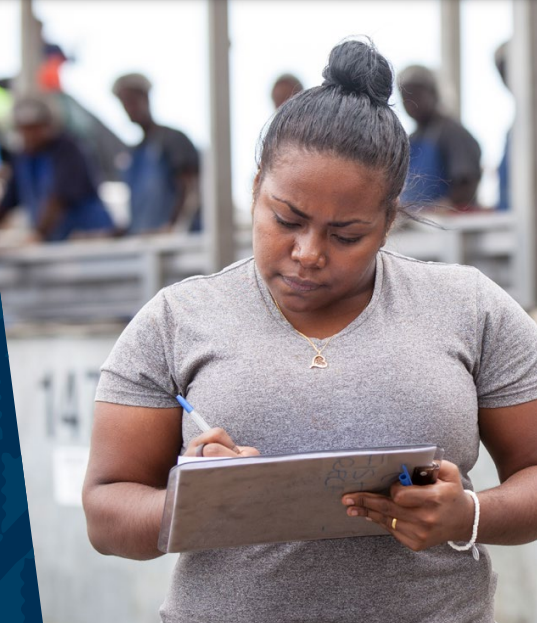
Waka Mere: Advancing Workplace Gender Equality 2017 - 2019
Intervention
From 2017 – 2019, the IFC ran the Waka Mere programme on the Solomon Islands, which focused on advancing workplace gender equality. In partnership with 15 large local companies, several interventions were implemented throughout the 2-year period. Solomon Airlines directed their efforts to addressing gender-based violence (GBV).
Partners
IFC, Solomon Islands Chamber of Commerce and Industry, Solomon Airlines
Key Results
- 90% of employees feel comfortable and are able to discuss workplace issues with their manager
- Employee wellbeing increased significantly due to the project
The goal of the Waka Mere programme was to address social norms that prevent women and men from fully participating in the workforce, thereby reducing business productivity, profitability, and reputation. Interventions focused on promoting women in leadership, building respectful and supportive workplaces, and increasing opportunities for women in jobs traditionally held by men.
Research carried out in the Solomon Islands and in other countries has found that forms of violence such as domestic and sexual violence, bullying, and sexual harassment impact significantly upon employees’ ability to remain safely and productively employed.
You may also view this case study as a downloadable pdf.
Whether it occurs at work or elsewhere, violence typically results in adverse company outcomes such as absenteeism, presenteeism (working while not in a fully functioning state) and staff turnover.
Addressing GBV in the workplace
In 2018, Solomon Airlines participated in a survey set up by Waka Mere on “How problems at home affect employees at work”. It focused on i.e. the prevalence of and employees’ views on domestic and sexual violence and its impact on workplaces. While the experience of violence is often assumed to be under-reported in studies like this, the IFC has deliberately followed existing guidance for such research intended to minimize under-reporting, and most importantly, not to do further harm or re-traumatize survey participants. Some main results include:
- One in three surveyed employees experienced domestic or sexual violence in the 12 months preceding the survey.
- 31% of participants said they believed that domestic and sexual violence is sometimes acceptable, with men more likely to have this opinion than women.
- 84% of participants recognised the potential or actual effects of domestic and sexual violence on workplaces. One in five said that they are currently working in the same workplace as the person who was or is abusive.
- 89% agreed the company should help staff affected by domestic and sexual violence.
In response to the survey findings, Solomon Airlines undertook several activities:
- With the support of Waka Mere, the company developed the Solomon Airlines Violence Policy to create a violence-free culture and workplace for its employees. The policy was designed by staff after they attended Waka Mere policy development workshops, through which they recognised a need to respond to violence holistically. The policy aims to reduce the risks of violence in the workplace, covering interactions such as those between staff and passengers and managers and team members. The policy also applies to non-workplace contexts and sets out measures to promote healthy relationships for employees and their families.
- Among the processes the company has implemented through the policy is a Contact Team, a group of staff from across the company who have been trained as first points of contact for employees who are affected by violence. The role of the Contact Team is to provide referrals to services and to assist staff to access reasonable workplace adjustments, such as the provision of special paid 10-day leave for staff to deal with issues arising from violence.
- The Solomon Airlines Violence Policy establishes a grievance procedure that deals with employees’ complaints related to bullying and sexual harassment.
Before, you hardly get these complaints or people don’t approach you because they’re too embarrassed about their situation or what happens to them when they get home. But now, I see that even men…are willing enough to come into my office and sit there and just talk about what’s happening at home… I feel that they have the comfort to come forward and discuss what they’re going through.
Results
In 2019, an endline survey was completed by staff, showing some promising results:
- The number of employees who believe there is adequate support and mechanisms in place for employees has doubled to 82%.
- Almost 90% of employees now feel comfortable at work, a 20- percentage point increase.
- Almost 90% of staff feel comfortable discussing workplace issues with their manager, an increase of 18 percentage points.
Want to learn more?
- Building Safe and Resilient Workplaces During COVID-19: Solomon Airlines Case Study, IFC, 2020
- Waka Mere Commitment to Action: Improving business outcomes in Solomon Islands through advancing workplace gender equality, IFC, 2019
- The Impact of Domestic and Sexual Violence on the Workplace in Solomon Islands: Survey report, IFC, 2019
- Researching Violence Against Women: A practical guide for researchers and activists, WHO/ PATH, 2005